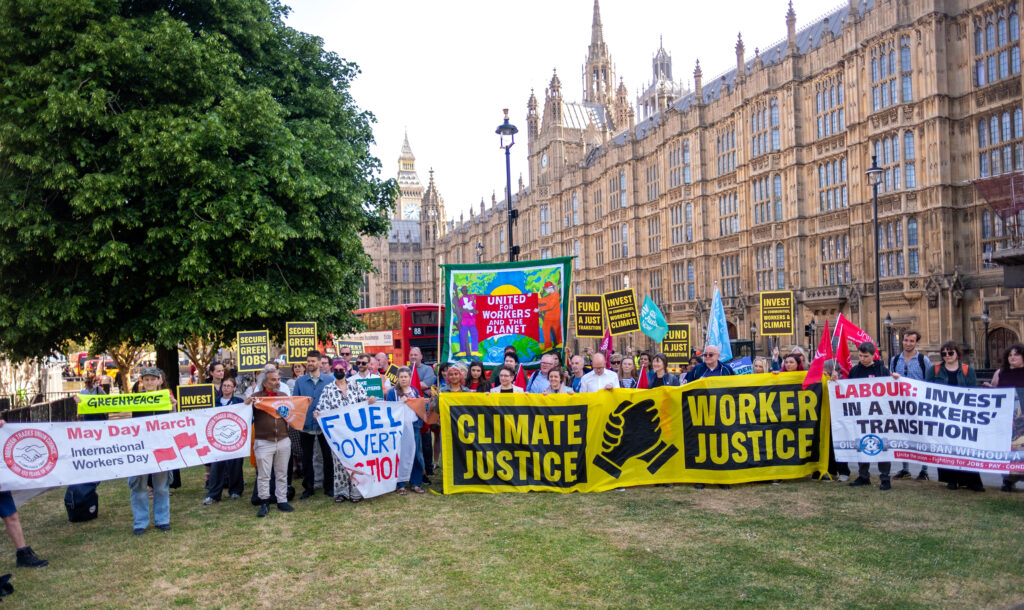
(Photo credit: © Angela Christofilou / Greenpeace)
Our analysis of government transparency data reveals that representatives of the fossil fuel industry met with ministers 133 times between October and December 2024, equivalent to nearly twice every working day and 5% of all published meetings. This follows our analysis of Labour’s first three months in power, which found that fossil fuel industry representatives accessed 104 meetings.
The largest portion of these meetings – 72 – were with ministers from the Department for Energy Security and Net Zero (DESNZ). DESNZ ministers logged 275 meetings altogether, so they spent 26% of their meeting time with fossil fuel representatives. Meanwhile, they met union representatives just 16 times and climate and social justice organisations only 27 times.
It is absurd that the industry most responsible for driving the climate crisis has access to this many opportunities to influence the ministers responsible for developing energy and climate policy. We know that in the vast majority of cases, fossil fuel companies seek access to policymakers in order to protect and bolster their fossil fuel profiteering. They are not meeting with ministers to work out how to transition away from fossil fuels. They are not meeting with ministers to develop a plan to support oil and gas workers into the renewables sector. They are not meeting with ministers to create a reparations programme for the communities most impacted by their extraction and pollution.
So what were they talking about? Let’s look at a few of the details.
- There were 25 meetings across all departments about Carbon Capture, Utilisation and Storage (CCUS). 12 of these meetings were with fossil fuel industry representatives. CCUS is a false solution – it has a track record of (expensive) failure, and it is being lobbied for by the fossil fuel industry in order to delay the transition away from fossil fuels.
- The Treasury held seven meetings about the Energy Profits Levy (aka the Windfall Tax) and all seven of them were with fossil fuel representatives. We’ve shown how fossil fuel lobbyists have successfully used their access to government to derail the windfall tax before; Labour should learn from this and stop giving them any opportunity to influence the tax policy in their favour.

- On 25th November, Shell met with Chancellor Rachel Reeves to discuss the UK’s energy transition strategy. 10 days later, Shell announced that it would stop investing in wind energy and focus instead on activities with “the highest returns” – oil and gas. Here’s hoping Reeves took any energy transition advice Shell had to offer with a barrel of salt.
- Similarly, on 7th October, Equinor was part of a meeting with Energy minister Michael Shanks about “common goals in renewables”. In February this year, Equinor declared plans to slash renewables investments in half and boost oil and gas output.
- In general, the fossil fuel industry muscled in on many of the meetings about renewable energy and the energy transition. BP, for example, was represented in eight meetings with DESNZ ministers and 7 of those meetings were about renewable energy: wind power, solar power, or Labour’s Clean Power Mission. Meanwhile, like Equinor and Shell, BP has also backtracked on its renewables investments and is doubling down on new oil and gas production. So, what business does BP have chewing ministers’ ears off about wind and solar? It’s all about controlling the narrative. Fossil fuel companies can no longer deny that the climate crisis is happening and that the products they sell are largely responsible. But what they can do is dominate the conversation about renewable energy to: delay the transition, ensure that they benefit from any economic opportunities offered by the transition, and generally paint themselves as essential to our energy future. It’s for these same reasons that the UN conferences on climate change (COP) are flooded each year by fossil fuel lobbyists.
Fossil Free Parliament is calling on government to restrict how it engages with the fossil fuel industry – to prevent the industry from exerting undue influence over climate and energy policy. The fossil fuel industry is attempting to delay and derail the energy transition – government needs to shift urgently from treating the industry as allies, to only engaging when absolutely necessary and with extreme caution. Just as public health policy is now protected from tobacco lobbyists, for real progress on climate and energy policy, it must be protected from the fossil fuel lobby.
Notes:
- Access to the full data analysis is available on request
- The government has published information about 2494 meetings held by ministers across departments between October to December 2024. Some departments had not made the data about their ministerial meetings available at the time that the analysis was conducted.
- For the purpose of this analysis, fossil fuel representatives have been identified as:
- Any company on the Global Oil and Gas Exit List (GOGEL) 2024 – the most comprehensive publicly available database on the oil and gas industry, covering the companies responsible for 95% of global oil and gas production
- Named individuals in decision-making positions at fossil fuel companies
- Trade associations and other membership-based organisations with at least 10% of publicly-listed members on GOGEL – for example: Offshore Energies UK (OEUK), Energy UK, the Carbon Capture and Storage Association (CCSA).
- “In the vast majority of cases…” – see recent reviews of oil and gas lobbying activity in the United States and Australia; Canada; the EU; Scotland and our briefing on lobbying in the UK at wide.
